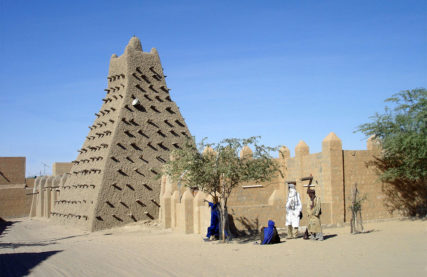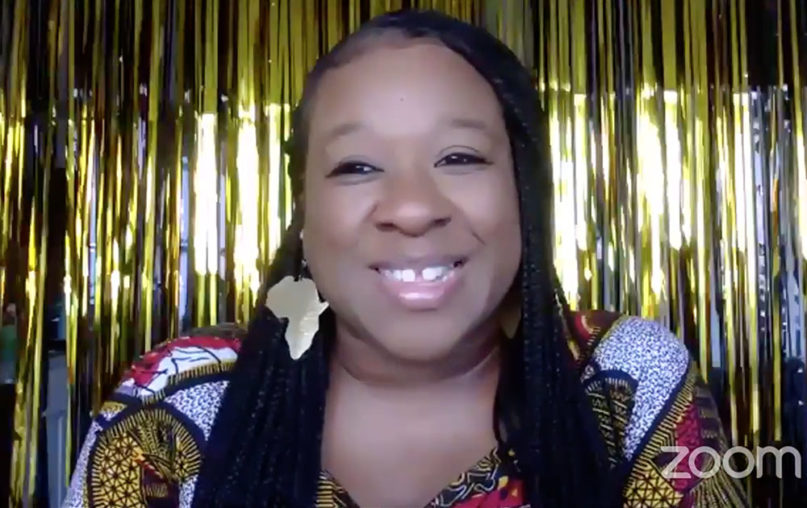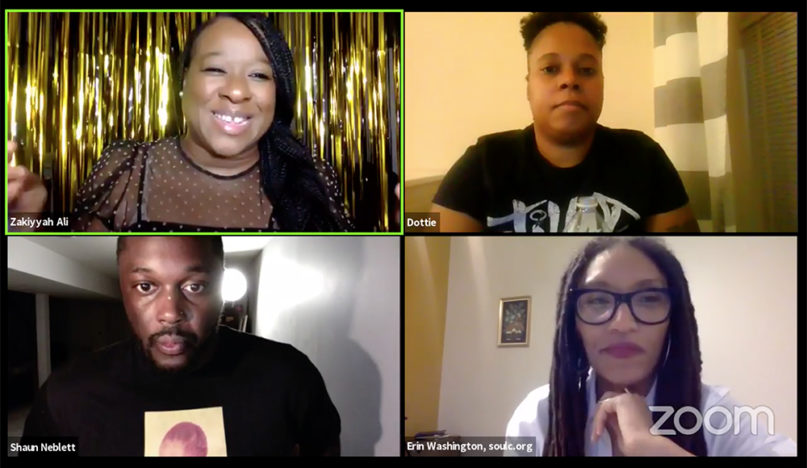(RNS) — When people see images of Black families’ homes in pop culture and media, educator Zakiyyah Ali says, they rarely get to see a library.
“I want Black families to understand that the library is attainable,” said Ali, a 44-year-old educational consultant who is earning her doctorate in educational leadership at Howard University.
Ali, who spent decades as a high school social studies teacher in New York City public schools, often works with school districts to inventory the books provided to students. Hardly ever do the books reflect the children inside the classrooms, she said.
“It’s imperative for us to start to rebuild libraries in our own homes and our schools so they are reflective of all our intellect and history, and to rebuild a Black consciousness.”
What better time to do that, she asks, than while schools are closed and families are trapped at home amid a pandemic?
Until schools begin again in late August, Ali is leading Rebuilding Timbuktu, a biweekly virtual, intergenerational read-along group focused on Black authors and thinkers.
For Ali, who belongs to the community of Muslims following Imam W. Deen Mohammed, the initiative is all about tapping into the ancient legacy of Timbuktu.

Part of the Sankoré Madrasah, one of several ancient centers of learning in Timbuktu, Mali. Photo courtesy of Creative Commons
From the 13th to 17th centuries, the West African city was a major economic hub, the epicenter of global trade routes. But Timbuktu was also an epicenter of learning, an international center of Islamic intellectualism; famously, the city’s greatest export was books.
Through Rebuilding Timbuktu, Ali hopes “to return us to a place of great intellectual achievement and critical thinking,” she told RNS.
Many of the two-dozen participants in the group are former students or friends, who bring their entire families in to attend each session. The eldest participant is in her 70s; the youngest, just two years old.
Launched on Juneteenth eve, the group has read seminal documents such as playwright Lorraine Hansberry’s 1964 “Young, Gifted and Black” speech, the Black Panther Party’s Ten-Point Program and Frederick Douglass’ speech “The Meaning of July Fourth for the Negro.” For the Islamic holiday of Eid al-Adha, at the end of July, the group will read poetry and literature by Muslim authors from the African diaspora.
“Everybody doesn’t have the privilege of going overseas, but we can expand our minds by reading different artists and different authors from different backgrounds,” Ali said. “That cultural diffusion is what Timbuktu represents to me — that you can be exposed to everybody’s shared knowledge, the way those caravans came through Timbuktu while they were traveling somewhere else.”
Timbuktu’s scholarship of religion, art, law, science and medicine; its massive libraries and renowned universities; its famous scholars, such as Ahmed Baba and Sharif Sidi Yahya al-Tadilsi; and iconic leaders, like billionaire ruler Malian sultan Mansa Musa, have cemented the city’s lasting reputation as a place of intellectual greatness among Muslims, the African diaspora and, indeed, the entire world.
The legacy of Timbuktu is a reminder of a history beyond what is taught in most schools, participants say.
“As an African American woman, sometimes our history starts with slavery, even though that’s not the truth of our legacy,” participant Nabeehah Aziz, 33, said. “Learning was always something that was held up and passed down in African cultures and generations of people.”
“It’s a tremendous amount of learning about African American history and our heritage,” said Ali’s sister, Labeebah Burrell-Ali. She and her adult daughter both join in the program. “There are all these fine details of history we never get, that are never taught in schools, so it just takes somebody to empower you with that information we should be entitled to.”

Zakiyyah Ali hosts a Rebuilding Timbuktu session. Video screengrab
The project began as an educational way for children and families to spend their time as schools closed and went virtual due to the pandemic. But it quickly became something more for participants.
“Every session, the viewership gets broader and broader,” Burrell-Ali said. “So it’s growing and changing, slowly but surely. I would love to see this as a university course or integrated into high school curriculums. All people, all students and generations, should be able to benefit from it.”
Part of the group’s success is in its accessibility. The group meets over Zoom twice a week but also livestreams the program onto Ali’s Facebook page, where the archives take on a new life and viewership among those who missed the live sessions. As a read-aloud group, participants do not have to read texts on their own beforehand as they would in a typical book club.
“I used to love sitting on the rug and hearing my teacher read to me when I was in elementary school,” Ali remembered. “I would really enjoy seeing her hold the book with her two fingers and then turn the pages and say, ‘What’s going to happen next?’”
Through Rebuilding Timbuktu, Ali aims to offer that similar “therapeutic feeling” and communal learning.
“When we read it together, then we’re channeling exactly what our ancestors did in the fields (when they) would sing field songs to stay connected with one another,” Ali said. “That way everybody could keep on pace. We can all work together to unpack what’s happening inside these texts.”
That also means youth can join in the discussions.
Aziz’s three-year-old niece, Layla, is a regular participant on the calls, even reading aloud to the group. “It’s good for the community when we create experiences that are for the whole entire family’s benefit,” Aziz said. “When we read collectively like this, even if we’re reading something I already know, I get to experience it from other people’s perspective.”





